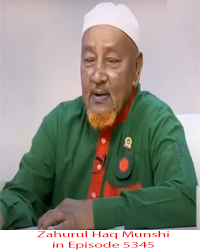Zahurul Haq Munshi

| Only freedom fighter who has been awarded the title of 'Bir Pratik' twice |
| Freedom fighter |
Full Name: Alhaj Md. Zahurul Haq Munshi, Bir Protik (Bar)
Date of Birth: September 30, 1950
Place of Birth: Bangladesh
Home District: Jamalpur
Nationality: Bangladeshi
Profile:
Md. Zahurul Haq Munshi, Bir Protik (Bar) (born 30 September 1950) is a freedom fighter in the war of independence of Bangladesh. For his immense bravery in the war of independence, the government of Bangladesh awarded him the title of Bir Pratik. In recognition of his heroism in battle, he received two heroic titles of Bir Pratik. So at the end of his name, in the first bracket, the hero symbol "Bar" is written i.e. Bir Pratik (Bar). He is the only freedom fighter who has been awarded the title of 'Bir Pratik' twice.
Munshi was born in Chandrabaj Sarkar's house in Baksiganj upazila of Jamalpur district. He later settled at Khamaria Para of Sreebardi Municipal Area under Sherpur district. He passed matriculation from Bandar Union High School in Narayanganj in 1969. His father Abdul Gafur Mia, mother Golecha Khatun and wife Mahmuda Khatun. Munshi was a dock worker in 1971. He used to work at Narayanganj Dock Yard from the sixties. He trained Ansar on his own initiative in 1964.
When the indiscriminate killing of Bengalis in the name of Operation Searchlight started at midnight on March 25, 1971, Munshi joined the local resistance war in Narayanganj on March 27. When the Pakistani forces captured Narayanganj on 10 April, Munshi moved to Araihazar thana. Then from there walk more than one hundred miles across different districts and upazilas and cross the border. Arriving in India, he took basic and special training in basic warfare and explosives under the supervision of BSF in Mahendraganj. In mid-April, he led the Indian BSF in a dangerous operation, destroying several bridges and cutting off roads from Mahendraganj to Tangail via Kamalpur-Bakshiganj. When Sector 11 was formed in August, Commander Munshi was responsible for laying mines on the Bakshiganj-Jamalpur-Sherpur road.
Munshi used to collect information about the invading forces from sellers of pan, bidis and cigarettes. Death is certain if caught at any moment. Yet the endless love for the motherland inspired him to move on. In November 1971, he took a basket of bananas mixed with poison to Gaibanda treasury. There was a camp of the invading forces. Munshi was chased away without paying the price for the bananas. After eating that banana, 28 invading forces died due to poisoning.
Munshi started his journey to Kairod Dhalu Camp in Jamalpur with a boot polish. The Pakistani soldiers punished the Razakars for writing Joy Bangla Joy Bangabandhu and Muktijoddha. He took part in the oncoming battle with Pakistani troops on the Bakshiganj-Kamalpur road in Jamalpur.
The nickname of the first Maratha Light Infantry (MLI) was 'Jangi Paltan'. Zahurul Haque Munshi took part in almost all the battles on behalf of this militant platoon from 6 November 1971 to 16 December 1971. The advice and courage of Commander Munshi made the entire militant platoon's campaign consistently accurate, targeted and successful.
December 9, 1971 was a special day for Munshi. He entered the Pakistani military base at Jamalpur with a letter calling for surrender to 31 Baluch Commanding Officer Colonel Sultan Mahmud Khan. When Commander Munshi, riding a bicycle in the guise of a farmer and flying a white flag, went to the camp of 1500 armed Pakistani soldiers and handed over the letter, he was brutally tortured. He was tied to the wheel of a jeep and presented in front of the Pakistani garrison chief. After reading the letter, Colonel felt humiliated. Some of the teeth in the front gums of Commander Munshi were immediately broken by the blow of SMG's butt. In the face of constant torture, Commander Munshi resorted to tactics. Said in broken broken Urdu, He is a poor farmer. The Indians forced him to come here. If he did not agree, he would be killed. Do not know what is written in this letter. Upon hearing this, the garrison chief ordered an end to the torture. After initial treatment, the commander released Munshi with a return letter. During the torture at the Jamalpur garrison, Commander Munshi saw the garrison chief's interpreter, Kamaruzzaman, the Jamaat's top war criminal.
Commander Munshi returned to the battalion headquarters at midnight after passing through such a procession of innumerable dead. The Pakistanis fired a 7.82 mm Chinese rifle in the return letter as a signal not to surrender. Immediately after receiving the memorandum with the letter from Commander Munshi, the commanding officer of the first Maratha Light Infantry decided to occupy the garrison at dawn. The self-imposed ruthlessness and the corpses of countless civilians lying on the Tangail-Jamalpur highway made Commander Munshi vindictive. The next day i.e. 10 December 1971, the Pakistani garrison was captured by the Allies. The memory of the tragedy of the genocide changed the mind of Commander Munshi. The comrades could not stop the Munshi who was standing on the pile of corpses of not one or two, but hundreds of Pakistani soldiers. Huge arms were seized by the Allies and the Liberation Army along with the bodies of 71 prisoners of war, 23 wounded and 235 Pakistani soldiers.
Register for comment









